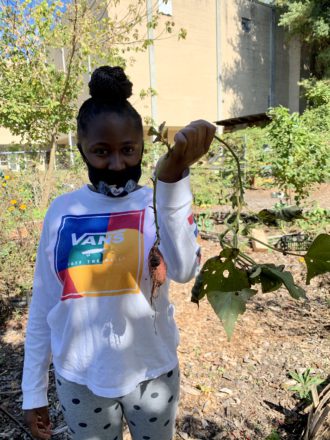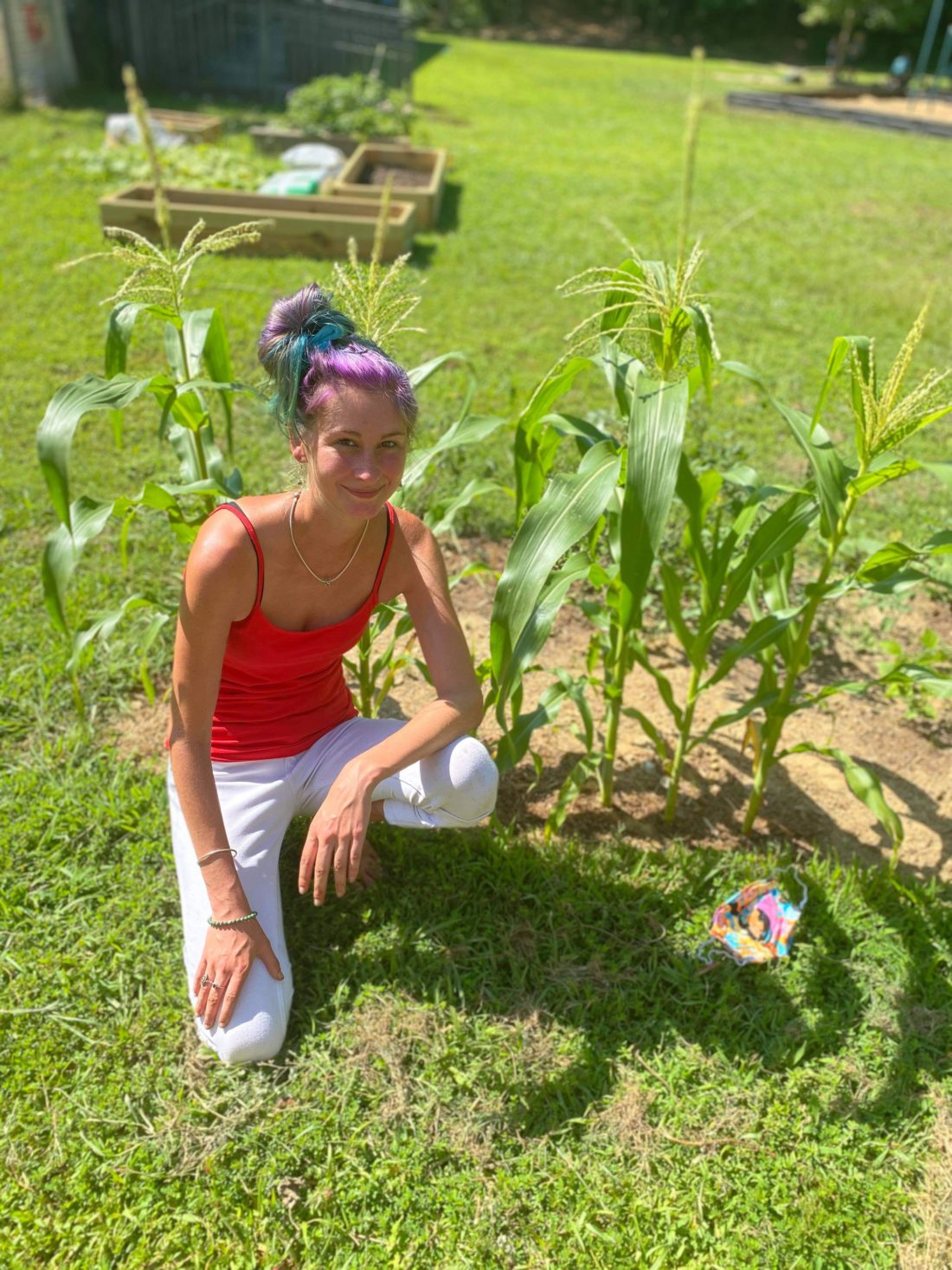Even with winter closing in, the young gardeners at Bell’s School for People Under Six in Fletcher are making good use of the plots and raised beds that occupy a broad corner of their sunny, open schoolyard. The corn, cucumbers, zucchini and sunflowers the children tended during the main growing season have been replaced by cabbages, collard greens and one patch of blue and purple pansies.
“We tried broccoli, but the rabbits ate it,” says teacher Jodie Williams, laughing behind her cloth face mask. “Most recently, [the children] helped me pull up all the dead plants.”
Williams, who teaches a reduced-capacity class of seven lively 3- and 4-year-olds, was recently named Henderson County’s Go NAPSACC 2020 Teacher of the Year for supporting health and wellness among her students through the Bell’s School garden. The county program is based on Nutrition and Physical Activity Self-assessment for Child Care, a set of national standards developed by UNC Chapel Hill researchers.
Garden learning has been core to Bell’s curriculum since it opened in 1978. And similar efforts across Western North Carolina have offered outdoor education opportunities at many other schools, as well as food security and sanctuary for their surrounding neighborhoods. But this fall, with many students learning online and in-person fundraising options limited by the COVID-19 pandemic, Williams and other local educators are digging deep and branching out to keep their school gardens viable.
In the weeds
Most WNC schools moved to virtual learning platforms in March, just as their gardening classes were putting seeds in the ground. Since then, finding labor to maintain those gardens has been imperative, says Cathy Cleary, outreach coordinator for Bountiful Cities.
The nonprofit’s garden and cooking education program, FEAST, collaborates with seven area elementary school garden programs and supports full- or part-time garden teachers at Vance Elementary, Hall Fletcher Elementary and the Francine Delany New School for Children. “You don’t think that much about what 20 kindergartners’ or 20 third graders’ impact on a garden might be,” says Cleary. “But just keeping on top of the weeds in these gardens is huge, and it’s something the students would be doing if they were there.”
As an early childhood center, Bell’s classrooms have remained open throughout the pandemic, although they will operate at half capacity for the foreseeable future. In March, when the school’s student population plunged from 40 children to just six, gardening efforts scaled back accordingly, says director Catherine Lieberman.
“We didn’t make a big [garden] space,” she says. “And typically, Jodie would have been planting seeds inside and then transplanted things, so this year we did a lot of late-season stuff, and some stuff we just bought as sets and planted.”

Hall Fletcher Elementary in West Asheville switched to virtual learning along with other Asheville public schools in March. With classrooms empty and no immediate plans for an online gardening curriculum, Hall Fletcher’s FEAST teacher, Summer Whelden-Kendall, says she ramped up food production to provide a “living community food bank” for school families and the surrounding neighborhood.
“We put down quick seeds, like peas and radishes, and a lot of low-maintenance crops like beets and carrots and got food out as soon as possible,” she says. The garden also encouraged home growing by giving away seedlings in the spring, hanging tomato baskets in the summer and elderberry plants in the fall.
With her usual army of student helpers remaining at home, Whelden-Kendall tapped community volunteers to create a new workforce. Due to social distancing concerns, she’s been reluctant to invite the community at large, but she says many neighborhood residents have been walking over to lend a hand, on their own or in pods, since the pandemic started.
Bountiful Cities also coordinated workdays at Vance and Hall Fletcher during the summer with small groups from UNC Asheville and Town and Mountain Realty to help with weeding and mulching. And the nonprofit’s landscaping program, Grass2Greens, has assisted with large maintenance and infrastructure projects.
Seed money
Although Bell’s School has fewer students these days, it’s nearly doubled the children’s outdoor time as part of COVID-19 protocols, so gardening has become more of a focal point than ever. “Parents who sort of knew we gardened and weren’t really that interested have become more interested in what we’re doing,” says Lieberman.
Williams points to a spiffy new set of raised beds where her students recently grew purple potatoes and other root vegetables, which they eventually harvested and cooked for their snacks. “A parent donated these,” she says. “And that’s pretty cool. I didn’t have those before.”
Where students are learning online, some garden teachers have found ways to connect through virtual offerings. Vance Elementary School FEAST teacher Jordan Diamond, for instance, created a YouTube channel this fall documenting the life cycle of monarch butterflies in the garden, Cleary says. And though Whelden-Kendall hasn’t yet moved online, Hall Fletcher may expand its virtual lessons in the spring to stream life sciences classes from the garden.
But funding is the ultimate determinant of how well school garden programs can function. Bell’s School writes support for its garden into its annual budget, so although overall funding has been negatively impacted by reduced class sizes, the garden will go on. “It’s part of our learning process here, so we’ll find a way to build it in,” says Lieberman.
At Hall Fletcher, a funding shortfall was part of the reason Whelden-Kendall’s position was cut from full time to just five paid hours a week last spring after COVID-19 put FEAST classes and other school-based programs on hold. “Much of the grant funding that we had applied for and were pretty sure we would get ended up being diverted to emergency response of COVID-19,” explains FEAST co-founder and Bountiful Cities program director Kate Justen.
Additionally, in-person fundraising events have been halted or altered by concerns over the pandemic, Whelden-Kendall notes. A student-run farmers market that helped support the Hall Fletcher garden ended when classrooms were emptied, while plans for the garden’s largest annual fundraiser, an Earth Day celebration, had to be abandoned in April.
Yet she’s working hard to make do. “We’re kind of a scrappy organization,” Whelden-Kendall says of FEAST. “We had some really bare-bones times before, so I feel like we’re kind of good at operating on a minimum. But we’re definitely exploring other avenues of funding wherever possible.”




Before you comment
The comments section is here to provide a platform for civil dialogue on the issues we face together as a local community. Xpress is committed to offering this platform for all voices, but when the tone of the discussion gets nasty or strays off topic, we believe many people choose not to participate. Xpress editors are determined to moderate comments to ensure a constructive interchange is maintained. All comments judged not to be in keeping with the spirit of civil discourse will be removed and repeat violators will be banned. See here for our terms of service. Thank you for being part of this effort to promote respectful discussion.